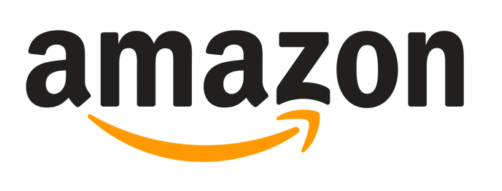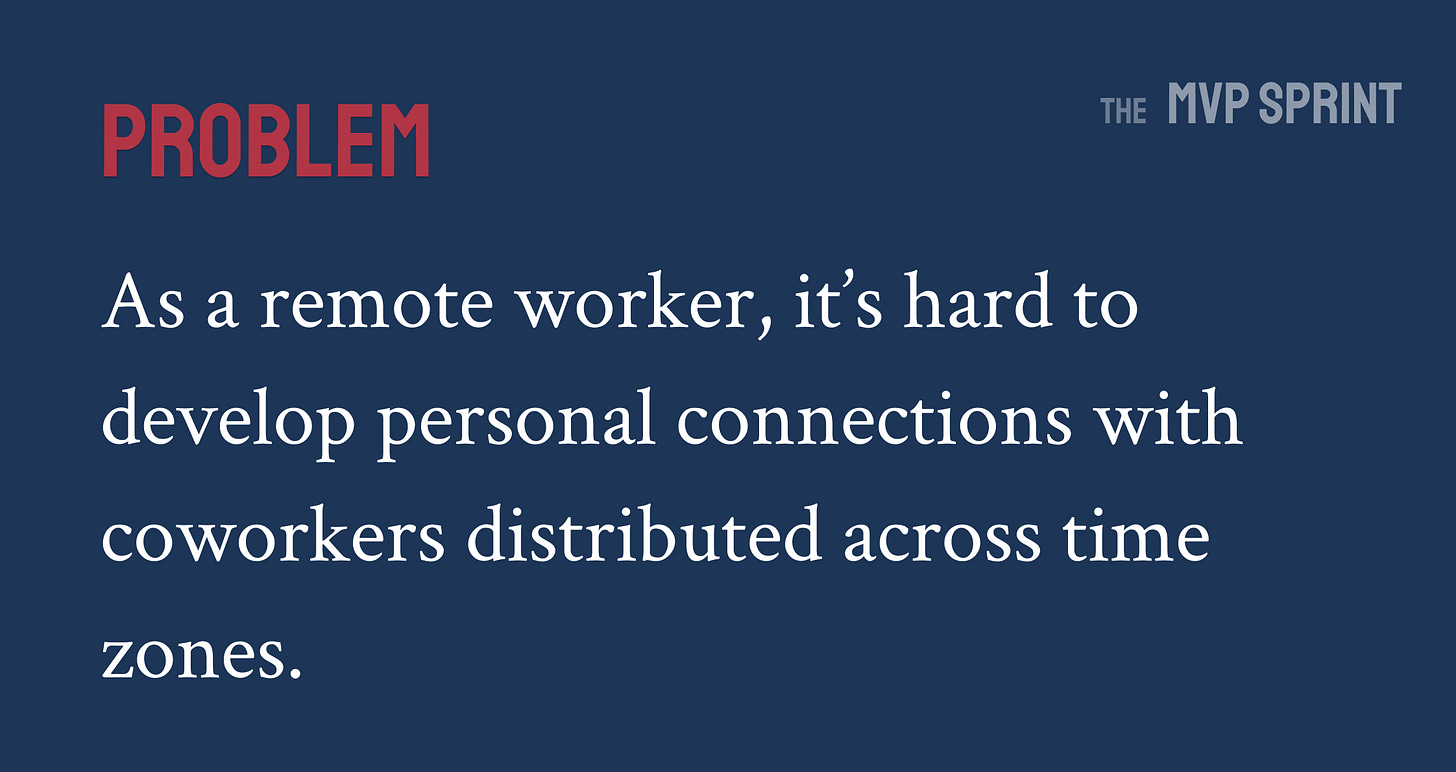Step #2 - Even unicorns walk before they run
Why you need to find a niche, and how I chose one in the remote work space.
I’m building a startup in public!
This is part 2 of my “MVP Sprint”, inspired by the Design Sprint. Read more about me and why I’m doing this on the About page.
Want to follow along? Subscribe to get next week’s update in your inbox:
From idea to revenue
Last week I chose a problem to work on. This week, I argue for why it’s important to niche down; then walk through the process of doing it myself.
Start small
Startups are all about big thinking - changing the world one peer-to-peer-mobile-social-uber-for-x at a time. But for me, now is the time to think as small as possible.
I’m talking about niching down. And it’s the most valuable thing you can do as a fledgling startup.
Might sound counterintuitive, right? I’ll dive into how I’m niching down within my problem space. But first, let’s look at how a few world-changing unicorns built their empires from more humble beginnings.
Niching down
The world's largest online retailer started off as an online bookstore. Jeff Bezos had visions of becoming "the everything store", but first niched down within a strategic vertical where he could dominate supply.
Wayfair sold over $9.1 billion worth of furniture and home goods in 2019. But in 2002, they sold speaker and TV stands on a site aptly named RacksAndStands.com. From there, they expanded to more and more similar niche sites, eventually rebranding as Wayfair nearly 10 years after launch in 2011.
Today, Facebook's users include nearly anyone with a pulse. But they started off as an online directory only for students at Harvard University.
I only need ten users
Right now my startup is nothing but an idea and some words scribbled here on the internet. My first goal is to find ten users that love my product.
No, ten users won’t make me rich. It won’t even pay my bills. But it brings something more valuable than electricity and running water - validated learning (a term introduced in The Lean Startup).
Validated learning is gained only through testing hypotheses with users. It’s my primary unit of progress at this stage, and with ten happy users, I’ll be swimming in it.
Ten enthusiastic users means I’m on to something. By talking to these users, understanding who they are, why they love it, and what they need, I’ll have all I need to go from 10 to 100.
Since I don’t need a huge market to hit these modest milestones, I get to take advantage of all the benefits of serving a small niche:
Product
Imagine a project management app for tax accountants in the US. Big market, but still pretty niche. It’s optimized for a narrow set of users, focused on their processes and workflows.
Now imagine if instead of US tax accountants, it served all tax accountants. A specific feature that Americans loved doesn’t work in Germany. A killer feature that Germans need confuses Australians.
A generalized product can kill you in the early stages:
It reduces product quality. Everyone gets a watered-down version that’s good, but not great.
It kills product velocity, how fast you can build and iterate. Suddenly even seemingly small features become daunting when you have to build for hundreds of use cases.
Messaging and marketing
Successful marketing isn’t about building lots of features and listing them on your home page. Your messaging needs to resonate with potential users.
With an appropriately niche audience, you can speak directly to US tax accountants using their language, technical terms, even inside jokes.
Leave them thinking “Wow, this product feels like it was built just for me.”
Distribution
How do you reach “accountants of the world”? Unless you want to pay for a Super Bowl ad with Peyton Manning doing VLOOKUP’s, you don’t.
But how do you reach US tax accountants? US tax accountants subscribe to the same blogs, hang out in the same forums, and attend all the same conferences.
This is much easier with a niche audience.
Choosing my niche
Let’s quickly revisit my problem:
Starting with the broad umbrella of “remote worker”, there are three directions in which I could niche down:
Industry
Remote workers in healthcare
Remote workers in real estate
Remote workers in tech
Job Function
Remote workers in sales
Remote workers in HR
Remote workers in operations
Company Remote Profile
Companies that are fully remote
Companies that are partially remote
Companies that are newly remote (only since COVID)
Or I could mix and match niches from different categories:
Sales professionals in real estate within companies that are fully remote.
HR professionals in healthcare.
Tech workers in operations in companies that are newly remote.
Criteria for choosing the perfect niche
Niche is sufficiently large
With an average Annual Contract Value (ACV) of $1,000, 100 customers gets me to $100,000 ARR (annual recurring revenue). I have bigger long-term goals, but for now, I won’t look any further into the future than this.
Could I grow to 100 customers within this niche?
This is primarily a true/false filter. A niche for which this is false gets ruled out, but a larger niche doesn’t get many bonus points.
Distribution channels
I’m thinking through distribution from the beginning - before I build anything.
Does this niche have existing, free, distribution channels with low barriers to entry?
Let’s break that down:
Existing - This is a blog they already read (where I can contribute), a community they already hang out in, or a physical place they already frequent.
Free - I don’t plan on paying to acquire users for a long time. “Cheap” isn’t good enough.
Low barriers to entry - A long-term growth strategy that builds barriers is a wonderful thing. But I’m still in the validation phase and need users now.
Emphasize quality over quantity.
Problem severity
How deeply do users in this niche care about the problem?
This problem hits home for certain types of remote workers more than others. I’m looking for niches where users aren’t just complaining, but are actually doing something to attempt to solve it.
Personal experience
How well do I understand users in this niche?
I know nothing about tax accounting (except that people seem to hate “busy season”).
On the other hand, I have personal experience in engineering, startups, and product management. I’ll be able to leverage that within these domains.
Choosing my remote work niche
Enough rambling; it’s time to choose my niche. Let’s evaluate a couple top contenders:
Remote HR leaders in tech
A leader in human resources is in charge of making sure the “human” part of an organization is running well. Interpersonal connection is important for humans, so this seems like a good niche.
Sufficiently large ✅
Distribution channels ✅ - Some googling uncovers Slack groups, Linkedin groups, blogs, an active subreddit, and paid societies.
Problem severity ✅ - Tech employees are notorious for bouncing from company to company every few years. Especially with the recent shifts to remote work, it’s more important than ever that HR professionals invest in building a positive work environment.
Personal experience 👎 - I’ve never worked in HR (never even had an HR violation 😁 ).
Remote product and engineering leaders in tech
R&D teams are typically led by an engineering and/or product manager. These teams are like mini-companies, each with their own culture and processes.
Managers are like mini-CEO’s. They’re responsible for the overall team outputs, but also for maintaining positive team morale.
Sufficiently large ✅
Distribution channels ✅ - Similar to the HR niche, there are subreddits, slack communities, blogs, Linkedin groups. Twitter is another great channel.
Problem severity ✅ - Managers have similar motivations as HR leaders. They’re scheduling social chats, game nights, and adopting tools meant to facilitate social connection. They’re already trying to solve the problem.
Personal experience - ✅ - I’ve worked in tech all nine years of my short career, with two of them as a Product Manager within a mid-sized startup in San Francisco. I have a large personal network of potential users in the tech world and understand them well.
The personal experience advantage puts this niche over the top for me. ✅
After choosing my niche, my problem now looks like this:
Reducing uncertainty one week at a time
Last week I chose a problem.
This week I identified my target users.
Over the next week, I’m going to validate the problem in the context of those users. I’ll attempt to answer:
Is it a real problem?
What are users doing today to try and solve it?
Want to get notified when Step #3 is published? Subscribe and I’ll hand-deliver it to your inbox.
I’ll be documenting my startup journey from idea to paying users over the coming weeks and months. I’d love to have you along for the ride.
Icons made by Freepik, Icongeek26, and Pixel perfect from Flaticon














